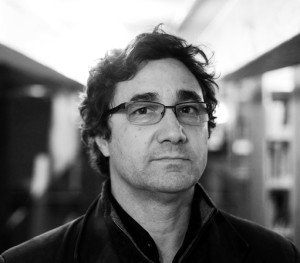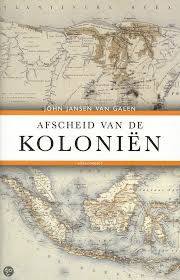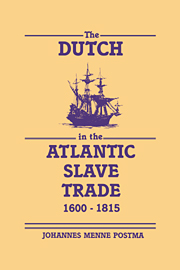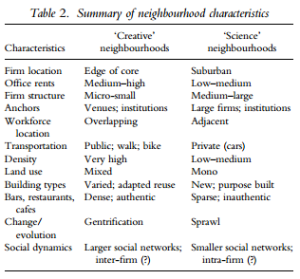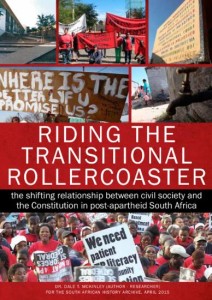 South Africa is fast approaching the 20th anniversary of the formal adoption of its Constitution. Not only does this provide an opportune moment to critically reflect on how this widely celebrated Constitution has shaped South Africa’s overall political, economic and social journey, but also on the path that the consequent relationship between the Constitution and civil society has travelled.
South Africa is fast approaching the 20th anniversary of the formal adoption of its Constitution. Not only does this provide an opportune moment to critically reflect on how this widely celebrated Constitution has shaped South Africa’s overall political, economic and social journey, but also on the path that the consequent relationship between the Constitution and civil society has travelled.
Casting our minds back to a time before the 1994 democratic breakthrough reminds us that the central political, social, economic and cultural edifice of the apartheid system in South Africa was built on the racialised foundation of a legally-framed, institutionalised violation of basic human rights. Indeed, the struggle against apartheid was, at its core, a struggle for the democratic reclamation of those human rights, whether civil-political or socio-economic. It was the popular strength and depth of this struggle that was primarily responsible for bringing an end to the apartheid system and ushering in a new democratic dispensation.
Within this historical setting then, it makes sense that one of the key requirements of a postapartheid South Africa would be to lay down a new foundation; a deracialised, legally-framed and institutionalised affirmation of basic human rights. The adoption in 1996 of South Africa’s new Constitution, containing a specific ‘Bill of Rights’ as well as the institutional architecture of a democratic system, represented the foundational layer of such an affirmation. The underlying rationale being that all the rights contained therein are, in and of themselves, basic human rights that are inherent, universal, inalienable and indivisible to every human being (in this case, as applied specifically to those living in South Africa).
Regardless of the historic and ongoing debates (some of which will be touched on later in this report) around whether South Africa’s Constitution and constitutional framework represent a legalinstitutional affirmation of basic human rights or alternatively, a well- constructed ‘mask’ that affirms and entrenches the social and economic status quo, the fact is that 20 years on the Constitution remains essential to any serious analysis and understanding of South Africa’s developmental journey. Central to that journey is the relationship between the Constitution and civil society.
It is within such a contextual frame that this report is located. Conceived as one component of a multi-faceted research and archival project through the South African History Archive (SAHA), the primary aim is to explore the changing relationship between civil society and the South African Constitution. The core material used derives from thirty-three interviews conducted with leaders of a range of civil society organisations (CSOs) as well as individual activists, academics and lawyers [see list of interviewees at end of document]. Taken together, the interviews cover the three main ‘sectors’ of civil society which this research targets – namely:
– legal / litigation;
– NGO / academic;
– community / union / activist.
The interviews have been complemented by desktop research on crucial constitutional rights cases that have come before the Constitutional Court as well as relevant academic, legal and activist materials written over the past two decades on civil society’s commentary on, outreach / advocacy about and interactions with, the Constitution.
Key issues informing this research are:
– The impact of the Constitution on the work of civil society;
– The changing attitudes of civil society towards, and levels of trust in, the Constitution;
– The extent to which the Constitution is accessible to civil society as a tool for transformation.
Download from: http://www.saha.org.za/transitional_rollercoaster.htm
The report is now available as a free download from the SAHA website, as are the transcripts of the interviews (now archived in SAHA Collection AL3287: The Constitution and Civil Society Project Collection.) You do have to be registered with the SAHA site to download publications and archival materials – one of the slight annoyances with being an organisation that has liberation struggle materials with complex copyright considerations as part of our archives (but it is quick and easy to register here, if you haven’t before – http://www.saha.org.za/users/register.php )
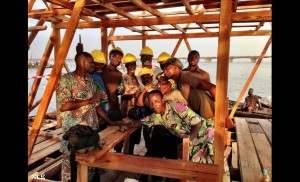 Nigerian architect Kunle Adeyemi is pioneering floating buildings to solve the issues of flooding and land occupation that affect hundreds of thousands in African coastal cities, including the 85,000 residents of the Makoko slum in Nigeria’s capital Lagos.
Nigerian architect Kunle Adeyemi is pioneering floating buildings to solve the issues of flooding and land occupation that affect hundreds of thousands in African coastal cities, including the 85,000 residents of the Makoko slum in Nigeria’s capital Lagos.